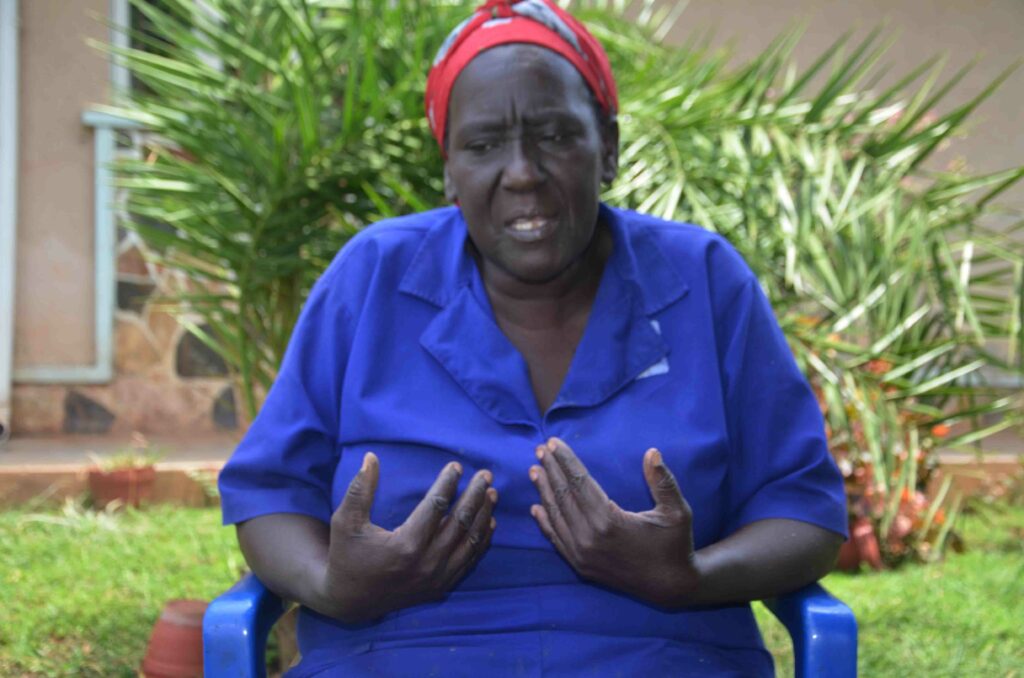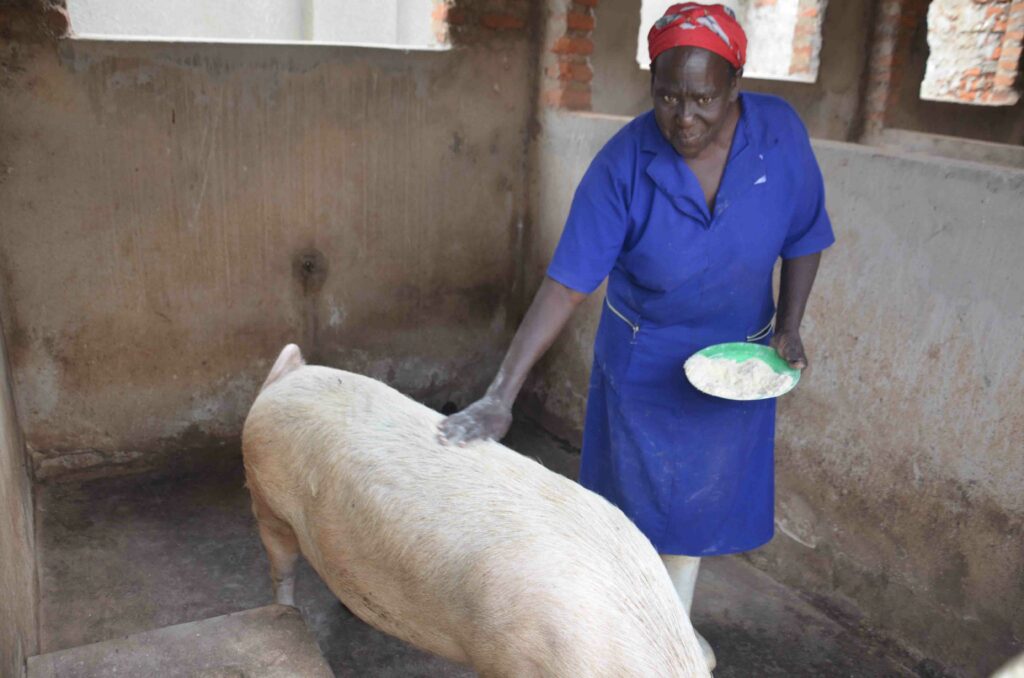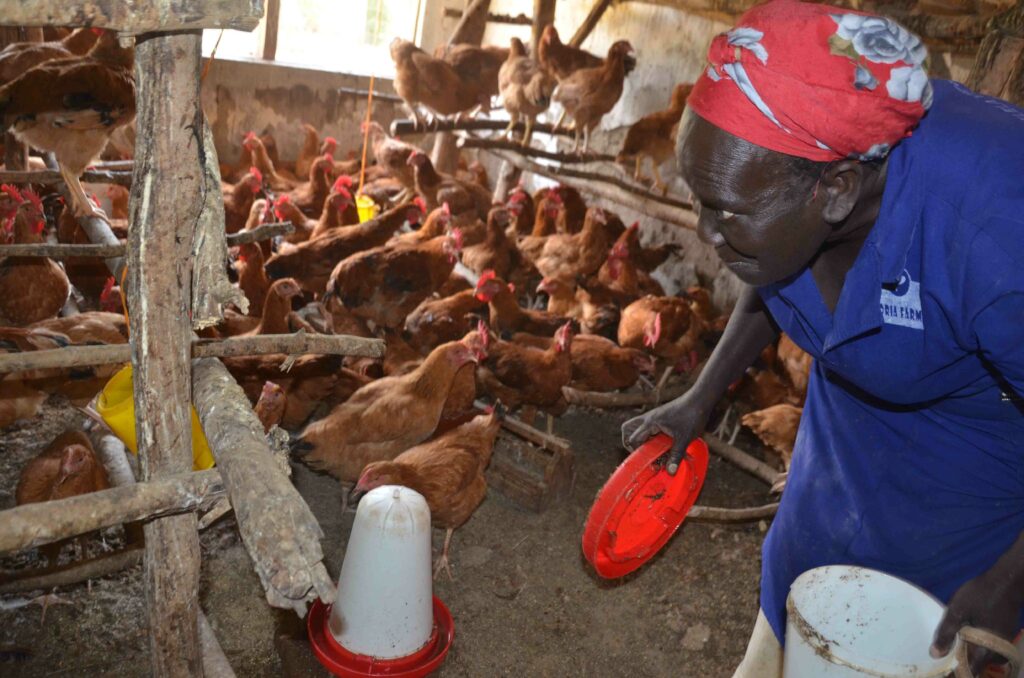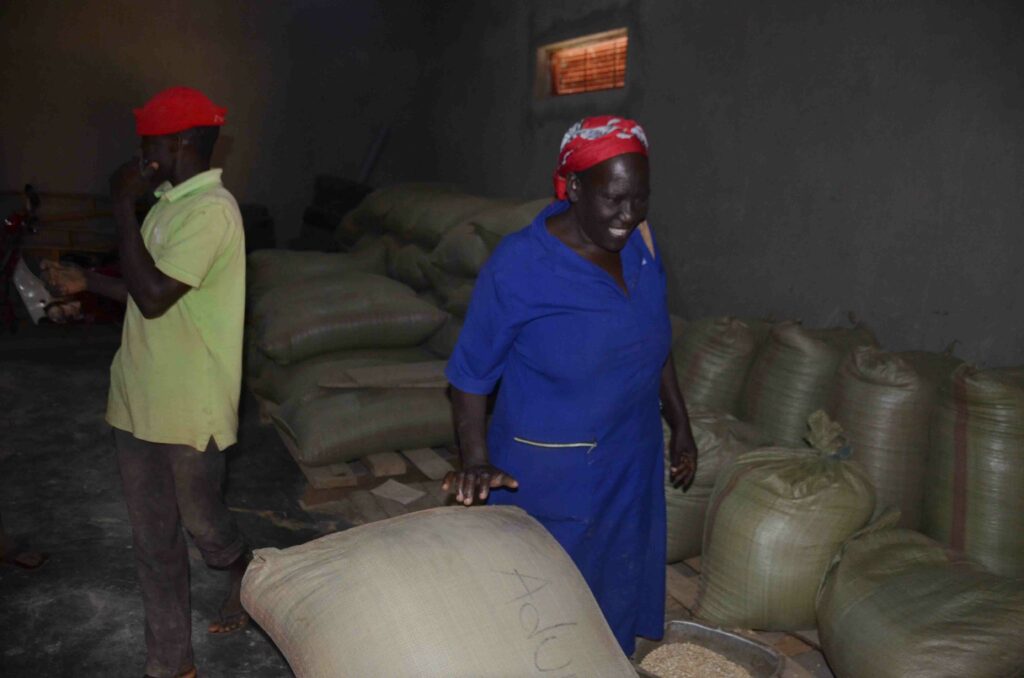By Patrick Okino
A quiet environment and hygienic compound welcomes whoever moves to Margaret Adupa`s farm, Telela Victoria farm at Telela village, Lira City East Division, north of Lira City. Adupa is practicing piggery and poultry farming.
She rears pigs but I didn’t hear any oinking or grunting noise or smell dirt, prompting me to develop doubts since the environment was quiet, nit and looking beautiful.
Before I could pick up the phone and call, I craned my neck over the wall-fence to check and confirm if it was the real place, where a retired secondary school teacher turned farmer is practicing piggery and poultry farming.
“This is my small home where I am rearing pigs and poultry,” Adupa welcomed me in her home behind Lango College, one of the traditional schools in the country.
Adupa was inspired to venture into when the government programme of National Agricultural Advisory Services was still active.
“It was 2006, when I found Dr Joel Ongebo, the former district NAADS coordinator training a group of women at Omito trading centre on piggery farming and what you need to observe when starting a project,” Adupa begins.
“Most of the women here are now interested, why don’t you join them,” Adupa quoted Ongebo as saying. In affirmative she accepted the request and started going for the training.
She says the women whom she could not recall the number, never picked up and shortly the venue for the training was relocated to her home.
She added that they started conducting training in the afternoon on the benefits of piggery and also how the project could supplement her meagre monthly earnings.

Starting out
Adupa who was still teaching at Comboni College in Lira did not hesitate to venture into piggery. She procured four piglets (three female and one male) at the cost of sh200000. Each piglet costs sh50,000.
Besides, the National Agricultural Advisory Services NAADS promised to procure more piglets and give them to Adupa.
“My piglets were good breeds and NAADs pledged to add more for me but they didn’t honour their promise,” Adupa who is practicing farming in a four acre piece of land said.
Fortunately, a few months later, according to Adupa, each sow bore eight piglets bringing the total to 24. Unfortunately, eight of them died and she sold the remaining 16 at sh80,000 each earning sh1.2m.
From this point, Adupa started banking a lot of hope and interest in piggery and how to access good breeds and quality feeds for a good outcome.
After selling the breeds in 2007 Adupa searched for other quality breeds but luckily she found them at St Katherine secondary school in Lira and bought two.
She says she bought the breeds identified as landrace at sh60,000 because she wanted to bring in different breeds in the farm. The farm now has three breeds, large white, combrough and landrace.
She again continued to look around since there was some balance left and bought three piglets at 120,000 with each costing sh40,000.
“The skills I got during the training helped me a lot to identify good breeds and how to manage them. Each time I got to any farm I was able to select the best breeds,” she added.

Expanding the farm
Adupa started with four piglets and would save a part of her salary to use in the expansion of the farm. She said she continued to add more piglets, made sales and in 2012, she had 100 pigs in total. These included piglets.
She said the project picked up and community members, local leaders and NAADs officials realized she had good breeds of high quality, and they made a beeline for her farm including clients from other districts.
Pader and Agago district local governments were Adupa`s prominent customers who could buy the piglets and give to farmers under NAADS programme.
“I really got a lot of money from the sales of piglets, more than the pigs themselves,” she said, adding that she would sell a month old at sh100,000 and also trained the leaders how to keep the animals.
Piggery units
At her farm, Adupa has a big piggery unit separated into small units where piglets, female pigs, sow (pregnant pigs) and male are kept separately. The unit has 250 pigs including 90 piglets.
She says the farm has not been registered but she was struggling to secure some money and register it soon.
It also has a big store to keep feed, four water tanks to pump water and a small hole to channel waste into a tank in which biogas is made.
Feeds
As the farm expands, the rate of feeding also shoots up and according to Adupa, she buys 1,000 kilograms of feed monthly.
She says to supplement the feeds she now produces maize and soybean.
She says she grows the maize in a three acre piece of land located in the same village and it has since reduced the quantity of maize bran.
She says both pigs and piglets’ feeds are expensive and when they are more than 200 like hers, they consume 1000kg in a month.
She adds for the piglets she gives two kilograms of feed daily and for the big one each consumes three kilograms.
Benefits
The benefits of pigs include generating income, waste products used as biogas for cooking and fertilisers, among others.
“It also keeps me busy,” Adupa who retired last year said.
“I have also employed three staff to help me in the farm,” she said, adding that the boys are tasked with giving feed, cleaning the units and monitoring the health of the pigs.
She says the workers are residing in a separate house he built in the farm within the compound and she also takes care of them including providing medical care, meals, beddings, buying clothes and paying them an allowance.
Treatment
Because she keeps the units hygienic and out of bounds for outsiders, Adupa spends little on treating the animals. She treats them after three months especially when they give birth and also the young one after three days.
To keep diseases at bay, she has contracted a veterinary doctor to offer general treatment at a fee. She says she spends sh350,000 monthly including the doctor`s fee depending on the number of pigs treated.
“That is why my pigs rarely fall sick,” she said.
Market
Adupa says her potential customers are in Gulu City including a few pork dealers in Lira City.
“I remember at one time, they came and bought 10 pigs at sh500,000 each which earned me sh5m,” she said.
She added that when she started the project 17 years ago, she made a lot of money on piglets because by that time NAADs was still active and the demand for the animal was very high.
Her main clients, according to Adupa, were from Pader and Agago districts.
Family involvement
Adupa says some of her children actively participate in the project by cleaning the units, providing feed, carrying out research, buying New Vision and washing the pigs.
During holidays, Adupa says, the children participate in cleaning the house, washing the young one and feeding them.
“Like my husband Dr Cyprian Benedicto Adupa helps me a lot that is why the project has expanded and it’s still on course,” she explained.
Adupa, who is a senior lecturer at Kyambogo said he does a lot of research including getting ideas to boost the farm.
He said every week on Friday he doesn’t miss New Vision, especially to read the Harvest Money section to acquire skills to continue improving the farm.
“The farm is able to grow faster because of a lot of research, financial contribution and getting a lot of reading materials including New Vision,” he said.

Community impact
The community has learned what should be observed when you want to venture into a piggery project for commercial purposes.
“They always come. Like four families in my neighbourhood have started imitating what they have learnt but the only challenge is getting feed because it is too expensive,” she said.
“Most of them are keeping though they are complaining of feeding but I advised them not to give up,” she added.
Neighbours speak out
Robert Otak, one of the neighbours says he started associating with Adupa when she was still practicing Frisian farming which later she abandoned the project.
He says when she went into piggery and chicken rearing, he started admiring to also start the same but was limited by finances.
“Once in a while when I visited she could take time and guide me on what to do when I want to start the project,” he said.
He says he raised some little money and bought two piglets from the farm and as he talks now the pigs are helping him to raise money for school fees for his children.
“Even in her farm, there is a borehole which helps the community a lot without paying a coin,” he added.
Moses Odongo, another neighbour says he has acquired skills and he was planning to start chicken rearing.
He said the skills she got from the farm was enough for him to start his own and progress.
Polly Otak, says they have realized that even if a child drops out of schools, he or she can still be relevant and generate income through farming.
She says Adupa has guided them on how to treat and feed the animals including keeping the hygiene when you want to reap big.
Challenges
She cited expensive feeds, erecting structures, treatment, unstable weather and market as some of the challenges hindering the speedy expansion of the project.
She says building piggery units needs a lot of money but many people make mistakes to erect temporary structures.
“Sometimes we run short of money to buy feeds which later put me in a very tricky position,” she says.
Tips for piggery
For any person willing to venture into piggery, according to Adupa, should secure land where it is not populated, save money for feed, put up temporary structures which are affordable, and have some money to buy feed and save for drugs.
Workers
According to Adupa, she only employs youths, especially school dropouts trained with the skills and later push some to do vocational training like mechanic, welding and carpentry.
She says to get reliable workers she sources for young people but not the category more than 25 years.
“I hire them and after two years and send them for vocational training,” she added.
Mistake
Adupa says one of the mistakes she made was to leave the farm, especially piggery units, open to everyone who came to visit.
“At one time there was a gentleman who came when he had slaughtered a contaminated (with swine fever) pig. He entered the unit and after a few days, the pigs started falling sick,” she said.
She says she realized very fast and sold about 80 pigs cheaply to avoid incurring losses.
“It affected me badly because those pigs were big which I would have sold at sh1.2m but I gave out cheaply at only sh800,000 each,” she added.
To mitigate this, she started restricting the numbers to her farm. She says she charges sh20,000 for whoever enters the unit, but when one buys a pig, that fee is refunded.
“Then treatment, I started giving them general treatment three times in a year,” she added.
Another mistake, she says at one time she was over fed them but later became stunted.
“I noticed and I was advised not to overfeed because it will affect the growth,”she said, adding she put a fixed ratio of two kilograms per day for the piglets.
“Instead of producing 12 piglets or 14 you just get 6 yet it is from the piglets that you reap the benefits of piggery farming,” she said.
Sales
Adupa sells each piglet at sh130,000 for a person taking more than 10 and a mature one between five to six months goes at sh600,000.
Sometimes Adupa prefers slaughtering and selling the pork by the kilo to get high returns.
“Owners of pork joints want to buy pigs cheaply at sh200,000 and when they slaughter they earn exorbitant profits. So I no longer pigs, but the pork and end up earning between sh500,000 and sh600,000.”
For her loyal customers, she relents and sells them live pigs at sh500,000 each, Adupa said.
Expenses
Adupa said she spends about sh2m monthly to buy feeds, pay three workers, and provide treatment, transports and labour.
She added that she pays a monthly salary of each worker at sh50,000, procure feeds at 500,000, treatment sh350,000 and the rest is spent on transport including people who provide daily services in the farm.

Sustainability
Adupa says for the project to remain vibrant and afloat, she is training her son, Adoko Ceasar to manage the farm.
She says he checks on the income she is earning from the project and takes note of the farm’s financial records.
“We plan together because in the future when I am gone, he will take over the farm and the project continues,” she added.
Poultry rearing
Besides piggery, in 2019 Adupa introduced poultry farming after visiting a progressive farming in Entebbe who had a number of enterprises in her farm.
In that farm, Adupa said, she saw poultry, pigs and turkeys doing very well. “I was told even students from big institutions and farmers go there to learn,” she added.
“I thought I should introduce it also because by doing so I will be earning from eggs, waste products and the chickens themselves,” she said.
She says she started the poultry project in 2019 with 50 broilers and later included layers.
“I got a lot of money from the sale of eggs which later motivated me to add more 50,” she added.
She says she spent sh600,000 to start the project which included purchasing feeds and providing treatments.
“I have three small rooms which accommodate 150 birds, but my target is to construct a decent poultry unit which can accommodate 1,800 birds,” she said.
Adupa collects 20 trays of eggs in a month and sells each at sh15,000.
She normally acquires each bird at sh9,000 from Family Poultry Care Farm, a breeder farm in Lira City, feeds and sells each at sh30000 after three months.
Security
To ensure the security of the farm is guaranteed and it remains safe, Adupa has installed CCTV cameras, deployed two dogs and fenced the area.
Record
Adupa says she keeps records of expenditure, treatment, income, amount of feeds used per month and when to treat them.
“It helps to guide me and keep me moving steadily,” she added.
Plan
She says by next year since she is permanently still at home, she is planning to expand the farm and have 3,000 pigs, improve on the breeds and add more piggery units.
Adupa`s profile
Adupa had primary education at Alebtong P.7, St Mary`s College Aboke in Kole (1976), Canon Lawrence Teachers College 1983, Ngetta National Teachers College 1988 and Uganda Christian University, Mukono for Bachelor degree in education.
She taught in Comboni College in Lira and later Lango College where she retired in 2022 and returned to fully engaged in farming.





